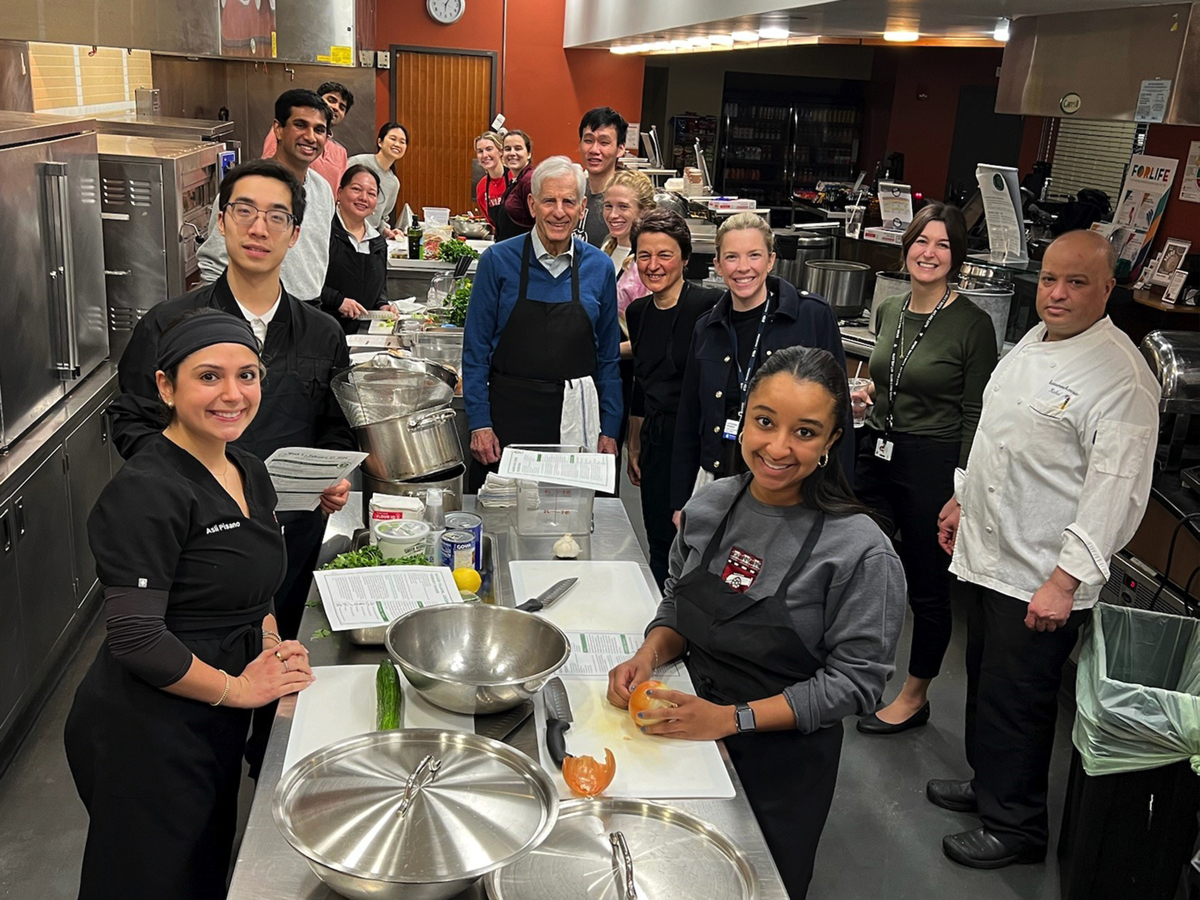When Kamber Hart enrolled in Harvard Medical School’s (HMS) new elective course, NCE 522: Culinary Medicine and Nutrition, during her final semester this spring, she was in part motivated by the benefits to her own health. Students get to cook and eat during class, while learning how to take better care of themselves amid the rigors of medical school. Plus, it meant free food.
But she was also compelled by a professional concern. Hart said she felt “acutely aware” that her medical education lacked meaningful instruction in nutrition. She noted that patients frequently bring questions about diet to their appointments with clinicians, seeking to determine whether advice they’ve seen online or elsewhere is legitimate. But, she said, “We don’t get enough training in medical school to be able to answer that question.”

A National Shortcoming
Hart’s concern touches on a hole many medical students at Harvard and around the country experience in their education. Even as a country-wide Food Is Medicine movement has attempted to raise alarm about the scale of illness caused by poor nutrition and lifestyle in the United States, advocates say nutrition remains peripheral to the primary curriculum at many medical schools—dragging down efforts to improve Americans’ health and combat major illnesses.
Parties on every side of the problem, from students in training to medical experts and administrators, acknowledge the need for clinicians to be fluent in basic nutritional counseling, but the structural changes needed to teach that skill have yet to materialize. Chris Duggan, director of HMS’s division of nutrition, attributes that in part to a particular focus on organ-based medicine in the United States, where the healthcare system is highly specialized, with comprehensive healthcare topics such as nutrition more confined to dietitians. Likewise, schools’ disease-focused medical education tends to consider nutrition a matter instead for public health. Despite the presence of the Harvard T. H. Chan School of Public Health next door to HMS, with its world-class health and prevention education taught by luminaries of the field such as professor of epidemiology and nutrition Walter Willet, the two school’s curriculums remain largely siloed.
That focus can translate into medical school curriculums that lack substantial instruction devoted to nutrition, leaving doctors underprepared for a key part of their job. Many U.S. clinicians report they don’t feel equipped to talk with their patients about their lifestyle—even when discussing issues for which poor nutrition and exercise could be a primary cause, such as heart disease. As one recent paper in the journal Advances in Nutrition notes, “diet-related diseases…are the leading causes of illness, disability, and death in the United States,” even though they are “largely preventable and treatable by nutritional therapies and dietary lifestyle changes.”
Even among doctors whose caseloads include significant instances of “diet-sensitive” diseases—such as cardiologists and endocrinologists who treat patients with heart disease and diabetes—nutrition education is largely absent from training, according to the study.
Even if equipped to provide basic nutritional counseling, physicians still face increasing pressure to work with speed and efficiency, which makes prescribing a pill easier than launching an extended conversation about lifestyle changes—especially when patients may face systemic barriers to such change: living in a neighborhood where fresh or healthy food is scarce, for instance, and where cheap, fast food is abundant.
All these factors combine to create a challenging environment for experts trying to bring more nutritional counseling into the healthcare system. “It’s a bit depressing that we haven’t made the progress we could be making,” said Walter Willett, a renowned professor of nutrition at the Harvard T. H. Chan School of Public Health (HSPH). He noted much of America’s health gains in the last few decades have been concentrated among the highly educated. Life expectancy in the U.S. has also remained consistently below that of other developed countries.
Nonetheless, the obvious need, student interest (public events and courses offered by HMS’s division of nutrition are highly popular; demand for both of its current classes outpaces available seats), and substantial Harvard-based research on nutrition, have not been enough to change the educational requirements for the student body as a whole.
“Not Where We Need to Be”
In its doctor of medicine curriculum, HMS requires no specific course or in-depth instruction on nutrition. Existing courses on the subject, though highly successful according to Duggan, are elective to varying degrees. Instead, the primary way students are supposed to learn about nutrition as they navigate curricular requirements is through small lessons spread out across their four years of schooling, formalized as a “curricular theme” but taught mostly at instructors’ discretion. In interviews, associate professor of population medicine Marie-France Hivert, director of the curricular theme “Nutrition and Lifestyle Medicine,” and HMS dean of education Bernard Chang ’93 acknowledged that method is falling short.
“Without commitment of hours in the curriculum, that integration, the ‘weave,’ unfortunately has not been successful,” Hivert said. Most faculty members themselves may not have received a strong nutritional education to draw from, and, as frequently happens within the healthcare system, Hivert pointed out, they can tend to emphasize the diagnosis and treatment of a disease more than its prevention. Given the time constraints to teach what is already a near-mountain of content to M.D. students, nutrition often ends up by the wayside —“to my own despair, because I’ve spent countless hours in building material with people,” she added.
Chang, who oversees faculty governance of HMS’s curriculum, acknowledged in an interview that “nutrition just has not occupied enough of a space in our curriculum.” “We are doing a much better job than we used to,” he continued, “but we’re still not where we need to be,” calling criticisms of Hivert and others as “valid.”
For assistant professor of medicine Helen Delichatsios and dietitian for HMS food services Eliza Leone, the co-creators of HMS’s “first of its kind” culinary medicine elective this past spring (distinct from prior nutrition courses), the solution begins with active instruction in nutritional counseling. Each week, along with readings and discussion, the class featured hands-on culinary experience making healthy recipes, offering students practical experience in how a healthy diet can be achieved at home while catering to different needs and tastes. They practiced nutritional counseling for patients with diverse needs, and learned how and when to refer a patient to a dietitian.
Both instructors said they found the externally-funded course’s first iteration a success. Students had “nothing but positive feedback in the end,” Leone said. Some added that they thought the course should be required. HMS dean George Daley even paid the class a visit.
From Weeks to Days to…
Two decades ago, every student might have expected to receive some of the instruction on diet and lifestyle Leone and Delichatsios’s elective aims to provide. Before 2007, a 14-week course on preventative medicine and nutrition was required of HMS students. Professors teaching at the time say it was a success—students emerged from the classes confident in nutritional counseling, and changed their own diets for the better, too.
But since then, the curricular commitment to nutritional education at HMS has slowly shrunk according to leaders like Hivert, Delichatsios, and Duggan—a byproduct of a wider effort in 2007 to reduce the time students spent in preclinical education (the period before they start learning in a hospital or clinic). That forced decisions on what material would have to be reduced or eliminated. Nutrition was forced to the chopping block, successively cut from 14 weeks of instruction to just three days.
By 2015, a renewed effort to increase time spent learning in the clinic led to more cuts; nutrition as a distinct requirement was eliminated, morphing instead into a “curricular theme” that would be integrated into other required courses, in theory. Nearly a decade later, a consensus appears to be emerging that the school must devote class time to nutritional instruction for it to be effective.
While Chang defended the decision to “longitudinize” nutrition across classes as logical, given the topic’s wide applicability to many aspects of health, he mused that not all aspects of the subject could easily fit into other classes, especially the skill of turning the science of nutrition into practical care for a patient. He emphasized that bridging classroom material on diet and lifestyle with clinical care was a priority for HMS, although it isn’t yet clear what form that would take.
He also cited several current efforts as examples of how nutritional education for medical students could be improved, including active discussions with other school leaders, and a recent pilot course offered jointly with HSPH that includes an online component on nutritional counseling.
Looking for Change
“When Harvard Medical School makes a change, you see that change filter through many other schools,” Chang said, discussing a potential expansion of nutritional education. “We are both part of the establishment, but we are the main way in which the establishment evolves and changes.”
But advocates like Ed Taff, a HSPH and HMS donor who funded the culinary medicine course, point to several lingering barriers. Nutrition isn’t emphasized on the U.S. Medical Licensure Examination—which students must pass to become a licensed physician. Its requirements significantly shape medical curriculums, so adding questions related to nutrition could help compel schools to teach the subject.
The federal government also has the power to promote change by leveraging its status as a major funder of medical education. In 2022, Massachusetts Congressman Jim McGovern led the passage of a House resolution calling for medical schools to teach about the relationship between nutrition and disease. Even state governments can play a positive role. Massachusetts requires physicians to be trained in recognizing domestic abuse as part of their certification, for example. Other states have mandated instruction in opioid addiction; a similar kind of requirement could be instituted for nutrition.
At HMS, an appetite for change seems present. Whether it will materialize into something concrete, however, has kept faculty members like Hivert frustrated. After several years of challenging the unsuccessful “theme” strategy, she said, “I have to admit that we need more than intentions.”








